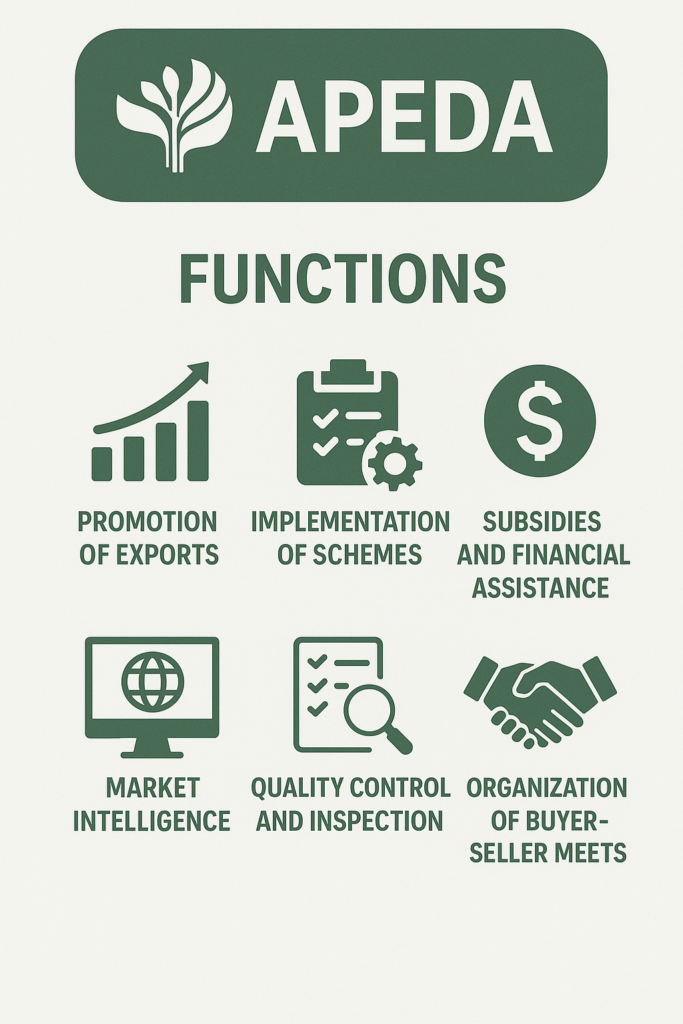
Introduction
The Agricultural and Processed Food Products Export Development Authority (APEDA) is a vital institution that plays a strategic role in boosting India’s agricultural exports. Operating under the Ministry of Commerce and Industry, APEDA supports farmers, exporters, and agri-businesses by offering subsidies, export promotion schemes, market access, and quality certifications.
Established to promote value-added agricultural exports, APEDA is instrumental in building India’s reputation as a reliable supplier of agricultural products globally.
What is APEDA?
- Full Form:
- Agricultural and Processed Food Products Export Development Authority
- Established Under:
- APEDA Act, 1985
- Ministry:
- Ministry of Commerce and Industry, Government of India
- Headquarters:
- New Delhi
- Website:
This diverse representation ensures well-rounded policymaking and implementation.
Objectives of APEDA
- Promotion of agricultural and processed food exports
- Setting quality standards and specifications
- Financial assistance for infrastructure and branding
- Conducting market research and export data analysis
- Capacity building of exporters and farmers
- Monitoring the export of scheduled products
Products under APEDA
APEDA is responsible for promoting export of the following major product categories:
| Category | Products Included |
|---|---|
| Fruits & Vegetables | Mangoes, Grapes, Pomegranates, Onions, etc. |
| Processed Foods | Pickles, Pastes, Ready-to-Eat, Dehydrated Products |
| Dairy Products | Milk Powder, Ghee, Paneer |
| Meat Products | Buffalo Meat, Sheep, Goat |
| Cereals | Rice (Basmati & Non-Basmati), Wheat, Millets |
| Organic Products | Organic Grains, Spices, Fruits, and Pulses |
| Floriculture & Seeds | Cut Flowers, Planting Material, Seeds |
| Alcoholic & Non-Alcoholic Beverages | Wine, Juices, Concentrates |
Functions of APEDA

APEDA performs various regulatory, promotional, and facilitative functions:
Development Functions:
- Infrastructure support (cold chains, pack houses, processing units)
- Export-oriented agri clusters
- GI product promotion
Certification & Quality Assurance:
- National Programme for Organic Production (NPOP)
- HACCP, ISO, GlobalGAP certifications support
Market Intelligence:
- Market research
- Export statistics and reports
- Demand-supply trend analysis
Capacity Building:
- Farmer training
- Exporter workshops
- Financial assistance for lab testing and packaging
APEDA’s Digital Initiatives
| Initiative | Purpose |
|---|---|
| e-ANAR | Real-time analytics of agri-exports |
| Hortinet | Traceability system for fruits and vegetables |
| Basmati.net | Online certification & tracking for Basmati rice exports |
| RCMC Portal | Exporter registration & renewal portal |
| Virtual Trade Fairs | Online exhibitions for global buyer-seller interaction |
Financial Assistance by APEDA (Under TIES & MIDH)
APEDA provides financial support for:
- Infrastructure Development (packhouses, pre-cooling units)
- Quality certification and lab testing
- Brand promotion in foreign markets
- Participation in international fairs
- Transport assistance (airfreight, refrigerated transport)
Organizational Structure of APEDA
| Designation | Role |
|---|---|
| Chairman | Appointed by Government of India |
| Secretary | Overall executive management |
| Members (Govt & Experts) | Includes representatives from Ministries, Exporters, Banks, Experts |
The Authority comprises representatives from:
- Ministry of Commerce, Agriculture, Food Processing
- NABARD, EXIM Bank
- Exporter associations
- State Governments
Export Performance under APEDA
| Year | Total Agri Exports (USD Bn) | APEDA Products Share (USD Bn) | Share % |
|---|---|---|---|
| 2020-21 | 41.25 | 20.67 | ~50% |
| 2021-22 | 50.24 | 24.57 | ~49% |
| 2022-23 | 53.00+ | 26.70+ | ~50%+ |
Major Export Destinations:
- UAE
- USA
- Bangladesh
- Iran
- UK
- Netherlands
- Vietnam
Comparison with Other Export Bodies
| Authority | Products Handled | Ministry |
|---|---|---|
| APEDA | Agri & Processed Food | Ministry of Commerce |
| MPEDA | Marine Products | Ministry of Commerce |
| Tea Board | Tea | Ministry of Commerce |
| Spices Board | Spices | Ministry of Commerce |
| Coffee Board | Coffee | Ministry of Commerce |
Case Studies
Case 1: Mango Exports to Japan
- APEDA supported Vapour Heat Treatment (VHT) infrastructure.
- Enabled Indian mangoes to meet Japan’s strict phytosanitary norms.
Case 2: Organic Millets to Europe
- APEDA promoted NPOP certification and facilitated cluster formation.
- Benefited tribal millet farmers in Odisha and Chhattisgarh.
How to Register with APEDA?
Step-by-Step Guide:
- Visit: https://apeda.gov.in
- Click on “Exporter Registration”
- Submit documents: PAN, IEC Code, Bank Certificate, Address Proof
- Pay Registration Fee: ₹5000 + GST
- Download RCMC (valid for 5 years)
Alignment with SDGs
| SDG Goal | APEDA Contribution |
|---|---|
| Zero Hunger | Export income for farmers |
| Decent Work | Employment in food processing & agri exports |
| Infrastructure | Export-related rural infrastructure |
| Responsible Production | Organic & sustainable farming |
| Global Partnerships | International trade collaborations |
APEDA Future Plans (2024-25)
- Export promotion of Millets, GI-tagged products, and ethnic processed foods
- Use of blockchain in traceability
- Enhanced farmer-producer organizations (FPO) integration
- Partnerships with global e-commerce platforms
- Certification expansion to climate-friendly agriculture
Conclusion
The Agricultural and Processed Food Products Export Development Authority (APEDA) is a crucial bridge between Indian farmers and the global market. From promoting sustainable farming to ensuring international quality standards, APEDA is playing a pivotal role in transforming India into a global agri-export powerhouse.
With robust policy backing, digitization, and a farmer-centric approach, APEDA is making “Brand India” shine across international food markets.
FAQs on APEDA
Q1. What is APEDA’s full form?
Agricultural and Processed Food Products Export Development Authority.
Q2. Is APEDA registration mandatory?
Yes, for exporters of scheduled products.
Q3. What is RCMC?
Registration-cum-Membership Certificate – mandatory for exporters.
Q4. Can farmers register under APEDA?
Yes, especially Farmer Producer Organizations (FPOs) and clusters.
Q5. Does APEDA support organic farming?
Yes, through the National Programme for Organic Production (NPOP).















